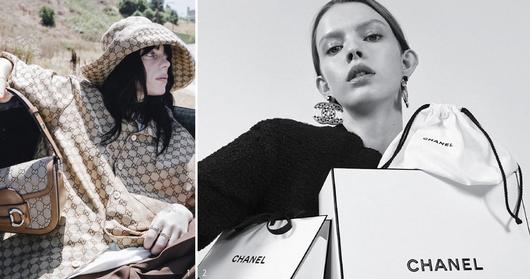Luxury spending slows in South Korea
 |
Chanel and Gucci saw its departement store sales decline in South Korea the first half of this year. / Gucci, Chanel |
<이미지를 클릭하시면 크게 보실 수 있습니다> |
South Korea’s luxury spending is slowing down amid an economic downturn, impacting even top luxury brands like Chanel.
Chanel’s department store sales in Korea declined by 1% year-on-year in the first half of this year to 514.2 billion won ($39 million), according to data on domestic luxury brand sales obtained by ChosunBiz. Retail industry insiders note that this marks the first time Chanel’s department store sales have experienced negative growth since the brand opened its first store in Korea in 1997.
Chanel is not the only luxury brand feeling the sting. Among the 20 luxury brands operating in Korean department stores, 11 reported sales declines in the first half of this year. In June, 14 brands saw their sales fall compared to the same period last year. Gucci (-24%), Fendi (-26%), Burberry (-17%), and Salvatore Ferragamo (-15%) experienced double-digit drops in department store sales. Even popular brands like Balenciaga (-2%), Bottega Veneta (-2%), Saint Laurent (-2%), and Celine (-1%) reported slight decreases in sales.
Of course, there have been exceptions to this trend. Hermès saw its sales rise 20% year-on-year to 402.9 billion won. Louis Vuitton’s sales increased 3% to 744.1 billion won. Other brands like Dior (2%), Prada (1%), Miu Miu (75%), and Goyard (24%) continued stable growth.
The recent luxury spending slump follows a period of strong growth during the COVID-19 pandemic when department store luxury brand sales surged 30% due to pent-up spending in 2022. But growth has slowed post-pandemic as consumers redirected spending toward travel, and the economic downturn has reduced the demand for luxury goods.
In the first half of this year, the combined sales of the top 20 luxury brands in department stores amounted to 4.24 trillion won, up 3% year-on-year. Analysts point out that this growth is effectively negative when considering the price hikes and new store openings by major luxury brands during this period.
“Sluggish domestic demand is beginning to affect the luxury goods market,” said an industry insider. “The slowdown in Chanel’s sales is a bad sign.”
Changing consumer trends have also contributed to declining sales for luxury brands. A few years ago, the so-called “flex” culture—where wealthy individuals, including rappers, flaunted their wealth—boosted the popularity of brands like Gucci and Balenciaga, known for their large logos and bold patterns. But in recent years, the luxury market has shifted towards “quiet luxury,” characterized by understated elegance.
For such reasons, sales of high-end jewelry and watches are rising. Brands like Boucheron (28%), Bulgari (26%), Van Cleef & Arpels (20%), and Cartier (18%) reported double-digit growth in department store sales, defying the overall trend of declining luxury consumption.
[Kim Eun-young]
- Copyrights ⓒ 조선일보 & chosun.com, 무단 전재 및 재배포 금지 -
이 기사의 카테고리는 언론사의 분류를 따릅니다.
기사가 속한 카테고리는 언론사가 분류합니다.
언론사는 한 기사를 두 개 이상의 카테고리로 분류할 수 있습니다.
언론사는 한 기사를 두 개 이상의 카테고리로 분류할 수 있습니다.


